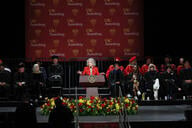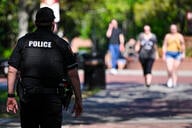You have /5 articles left.
Sign up for a free account or log in.
Five of Pennsylvania's 14 state-owned universities ended their blanket bans on concealed weapon carry under guidance from the state system, but last week the system shifted gears and told its institutions to sit tight -- leaving those that already switched over stuck with new policies allowing guns on campus.
That's too bad for F. Javier Cevallos, president of Kutztown University, who said in his announcement of the new policy last week, "I personally believe guns have no place on campus and by no means does this mean that we support having guns on our campus."
Presidents almost always say they want to ban guns from their institutions for safety reasons. But after the Pennsylvania legislature passed a law last year allowing people with licenses to carry weapons in public spaces, some college employees questioned whether their campuswide prohibition of weapons was legally sound. Lawyers for the Pennsylvania State System of Higher Education determined that the bans may in fact be vulnerable to lawsuits under the new law or the Second Amendment, and they advised the public universities to review their own rules. The system provided a model policy that allowed for weapons on public campus spaces but not in buildings or at sporting and other major events.
That was in April 2012, and it led to four institutions -- Millersville, Shippensburg, Slippery Rock and West Chester Universities -- easing their bans to reflect the model policy. But after the fifth, Kutztown, did so a couple of weeks ago, PASSHE issued a statement telling the rest to hold off.
The system had formed a task force this April to study general campus safety operations, and it would review concealed carry policies as well, PASSHE President Guido M. Pichini said in a statement.
"While the task force reviews this issue, the board has asked the universities to maintain the status quo in regards to their existing weapons policies," Pichini said.
But those that already took action are out of luck, Kutztown spokesman Matt Santos said, because by "status quo," PASSHE means, "current."
"We understand the concerns that go along with the change in policy," Santos said, "but at the same time, we need to do what we can to follow the directives that have been given to us and comply with the Second Amendment."
If PASSHE's task force, which is expected to finish its work this fall, supports the initial advisory, the state should expect to see all public universities with blanket bans follow suit, Santos said. (But officials for the state's community colleges and Pennsylvania State University indicating that they were not studying the issue.)
Compared to other cases where universities changed their policies to comply with state law, Pennsylvania's have been somewhat proactive.
Public universities in Oregon, for instance, only changed their policies after multiple courts ruled in a lawsuit that the state system did not have the legal authority to ban guns. (They still prohibit firearms in buildings and at events.) The University of Colorado resisted a law permitting concealed carry until the state Supreme Court court finally ruled it could not.
In both cases, the courts ruled that only the government had the authority to skirt concealed carry laws, under state laws. (Montana's public universities were spared from a similar fate last week, when the governor vetoed a bill that would have allowed concealed carry on their campuses.)
Mississippi and Wisconsin last year had to permit concealed carry after the legislatures passed bills specifically allowing for it on campuses. Utah, the only other state that permits the practice, has done so for years. Twenty-two states ban concealed carry on campuses outright, and 23 -- including Pennsylvania -- leave the decision up to individual institutions, according to the National Conference of State Legislators.
Four of the five Pennsylvania universities that now permit weapons on some parts of campus have joined the Campaign to Keep Guns off Campus, said Andy Pelosi, director of the organization.
The U.S. Supreme Court has found blanket bans unconstitutional but allowed public institutions to regulate "sensitive areas" (like campus buildings) in previous cases, said Nils Hagen-Frederiksen, press secretary for the Pennsylvania governor's Office of General Counsel. In January 2011, the Virginia Supreme Court upheld George Mason University's ban of guns in buildings and at events, ruling it permissible under the U.S. Constitution's Second Amendment.




